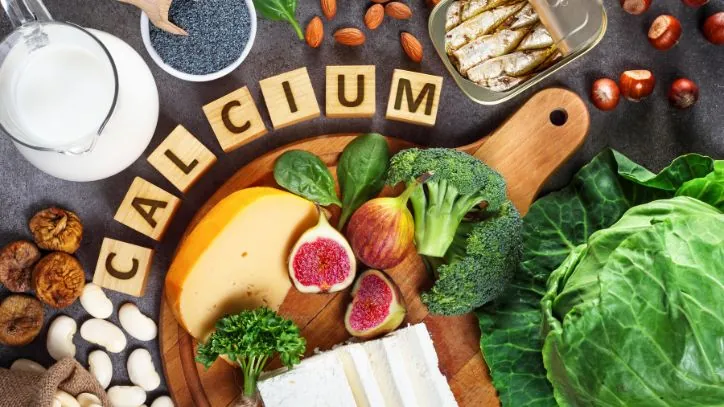Blog
Nutrition for Adolescents is Crucial For Bone Health

Growing up, I was often told to drink milk so that I would have strong bones when I got older. As a kid, this advice seemed like just another ploy by adults to get me to finish my food. However, as I’ve learned more about health and nutrition over the years, I’ve come to realize that there is significant truth behind those words.
The Importance of Bone Health
It is a well-known yet unfortunate fact that as we age, our bones begin to deteriorate. This deterioration can lead to a range of health issues, including osteoporosis—a condition where bones become brittle and fragile. The troubling reality is that it becomes much harder to build and replace bone loss as we age. The best time to build bone and set the foundation for less bone loss later in life is during adolescence.
Adolescence is a critical time for growth, and the nutritional choices made during this period can have long-lasting effects. According to the National Institutes of Health (NIH), 90% of adult bone mass is formed by the age of 18. Therefore, nutrition during this pivotal stage is crucial for optimal bone health.
The Role of Calcium in Bone Health
Calcium is one of the most important nutrients for bone health. Sue Shapses, a professor of nutritional science at Rutgers University, emphasizes that consuming sufficient amounts of calcium is critical. Whenever your diet lacks calcium, your body compensates by pulling calcium from your bones. This process can weaken bones over time. As we age, our body’s ability to absorb calcium also declines, making it even more essential to ensure adequate intake during younger years, when the body is still building bone density.
The recommended daily intake of calcium varies by age and gender. For adolescents aged 9-18, the recommended intake is approximately 1,300 mg per day. Good dietary sources of calcium include:
- Dairy products such as yogurt, cheese, and milk
- Leafy green vegetables like kale and broccoli
- Fortified foods such as cereals and orange juice
- Fish with edible bones, like sardines and canned salmon
Other Essential Nutrients for Bone Health
While calcium is critical, it is not the only nutrient necessary for maintaining bone health. Vitamin D plays a key role in calcium absorption and bone growth. The body produces vitamin D when the skin is exposed to sunlight, but dietary sources also include fatty fish, beef liver, cheese, and egg yolks. Furthermore, many food products are fortified with vitamin D, making it more accessible through diet.
Protein is another essential nutrient for bone health, as it constitutes about half of your bone’s volume. Bones are living tissues that continuously remodel themselves, and protein is responsible for the formation of organic bone matrix. Dietary protein sources include:
- Meats (like chicken, beef, and pork)
- Dairy products
- Eggs
- Legumes and nuts
Minerals like potassium and magnesium also contribute to bone health. Potassium helps to neutralize bone-depleting acid in the body, while magnesium is involved in bone formation by regulating calcium levels in the body. Foods rich in potassium include bananas, potatoes, and beans, while leafy green vegetables, nuts, and whole grains are great sources of magnesium.
Building Good Nutrition Habits Early
With so many components contributing to bone health, it’s important to ensure that children and adolescents are getting enough of these essential nutrients. Good nutrition sets them up for success, reducing the risk of osteoporosis and other bone-related health issues later in life. More than just focusing on calcium intake, it is about promoting a well-rounded, nutrient-dense diet.
School programs, parents, and caregivers play vital roles in encouraging healthy eating habits. This responsibility can include:
- Educating children about nutrition and its importance for health.
- Modeling healthy eating by incorporating bone-healthy foods into family meals.
- Making nutritious foods readily available at home without relying on supplements if possible.
Foods That Promote Bone Health
A balanced diet incorporating various bone-healthy foods can significantly impact an adolescent’s future bone health. Here are some examples of foods rich in the necessary nutrients:
- Dairy Products: Milk, yogurt, and cheese are great sources of calcium and vitamin D. Low-fat and fat-free options can help balance overall calorie intake while providing these essential nutrients.
- Leafy Greens: Kale, collard greens, and bok choy are excellent sources of calcium and other minerals that support bone health.
- Fish: Fatty fish like salmon and sardines provide both vitamin D and calcium, as well as omega-3 fatty acids which are beneficial for overall health.
- Nuts and Seeds: Almonds, chia seeds, and flaxseeds are great sources of both calcium and magnesium.
- Legumes: Beans and lentils are excellent sources of protein, calcium, and other vital nutrients. They are also an economical and versatile food choice.
- Fortified Foods: Many cereals and dairy alternatives are fortified with additional calcium and vitamin D. Always check labels to choose options with higher nutrient content.

The Local Impact: Arizona Farmers and Ranchers
One of the great advantages of living in Arizona is access to fresh, local produce and products. Arizona farmers and ranchers provide a range of foods that contribute to bone health, including dairy, meats, and eggs. Supporting local agriculture not only strengthens the community but also often ensures fresher, more nutritious food options.
Local grocery stores in Arizona frequently feature fresh products from these farmers, making it easier for families to incorporate nutrient-rich foods into their diets. Engaging with local farmers’ markets can also be an enjoyable way to source seasonal produce directly from the growers.
For more information on health and Arizona-grown products, checking out the Fill Your Plate blog can provide additional resources, tips, and recipes to incorporate bone-healthy foods into your kitchen.
Addressing Common Myths About Bone Health
Despite the wealth of knowledge surrounding nutrition and bone health, several myths persist. It’s essential to debunk these misconceptions to encourage healthier eating habits among adolescents.
- “You only need calcium for bone health.” While calcium is crucial, as previously discussed, other nutrients, including vitamin D, magnesium, and protein, also play significant roles.
- “I can get all the nutrients I need from supplements.” While supplements can be beneficial in certain cases, it is always best to obtain nutrients through a whole-food diet. This approach provides the synergy of nutrients that supplements often lack.
- “Only old people need to worry about bone health.” As mentioned, peak bone mass is achieved during adolescence. Proactive efforts during this time can prevent future health issues.
The Importance of Regular Physical Activity
Alongside good nutrition, regular physical activity is vital for bone health. Weight-bearing exercises, in particular, stimulate the bones to grow and strengthen. Activities such as:
- Walking or hiking
- Running or jogging
- Playing sports like basketball, soccer, or tennis
- Dancing
- Resistance training (using weights or resistance bands)
Regular physical activity, combined with a balanced diet, creates a robust foundation for bone strength. Encouraging adolescents to engage in various activities can help them find enjoyment in being active.
Conclusion
Nutrition during adolescence is crucial for long-term bone health. Focusing on a diet rich in calcium, vitamin D, protein, and other essential minerals can build a solid foundation for healthy bones throughout life. Local resources, such as fresh foods from Arizona farmers, can facilitate easy access to these necessary nutrients.
Moreover, by actively incorporating physical activity and promoting healthy eating habits, we can help ensure the next generation is well-equipped to thrive in their health journey. The lessons learned today can empower adolescents to make informed nutritional choices that will serve them for years to come.
To learn more about bone health and nutrition, consider exploring additional resources such as the NIH Osteoporosis and Related Bone Diseases National Resource Center and the National Osteoporosis Foundation.
Embracing these practices will not only bolster individual health but also contribute to healthier communities where stronger bones will ultimately pave the way for a healthier future.
By Heide Kennedy, Arizona Farm Bureau Communications Intern


















